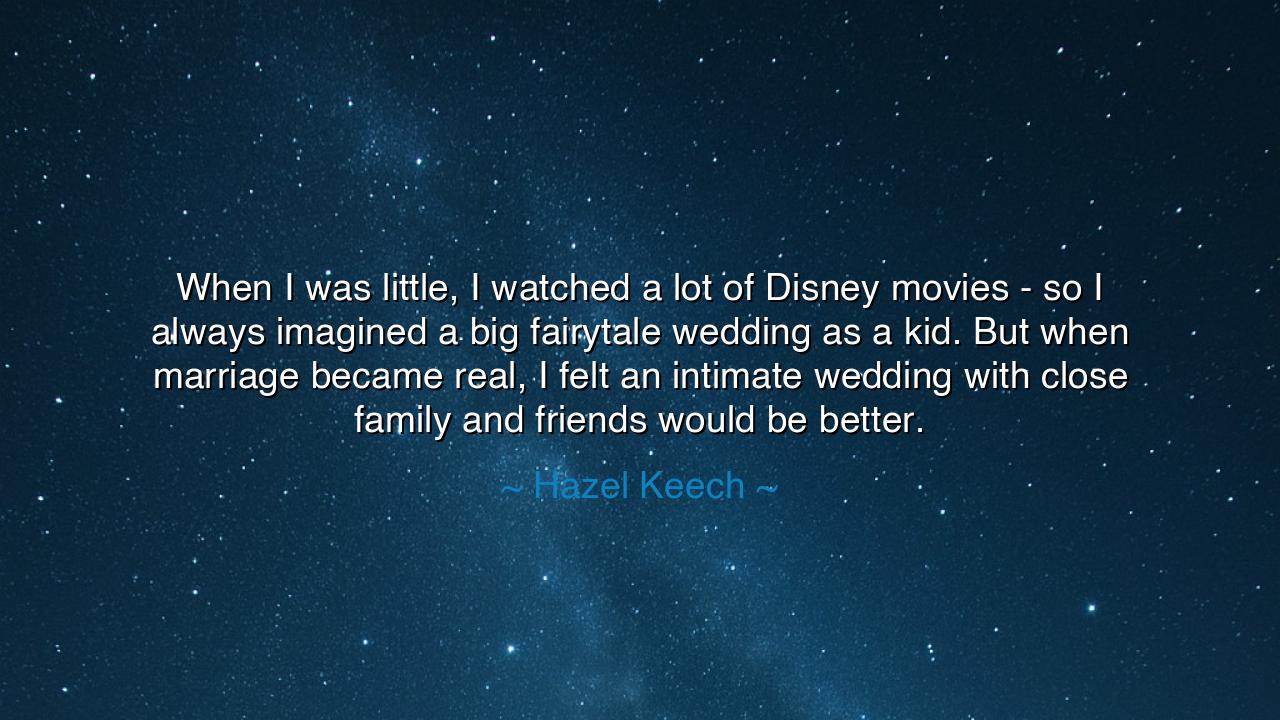
When I was little, I watched a lot of Disney movies - so I
When I was little, I watched a lot of Disney movies - so I always imagined a big fairytale wedding as a kid. But when marriage became real, I felt an intimate wedding with close family and friends would be better.






Hearken, O children of growth and awakening, to the words of Hazel Keech, who speaks of the journey from childhood dreams to adult wisdom. She tells how, as a child, she was enchanted by the Disney movies she watched, their tales of princesses and magical kingdoms shaping her vision of a big fairytale wedding. In her young heart, love was grand and filled with spectacle, with glittering halls and countless guests bearing witness. Yet, when the time came for marriage to become real, she found herself longing for something different: a small, intimate wedding, surrounded only by close family and friends.
This reflection reveals a timeless truth: the dreams we hold in youth are often born of innocence and fantasy, shaped by the stories we are told. In childhood, we imagine love as a sweeping, public display, much like the great royal weddings of history. But as we grow, our hearts begin to seek not the outward grandeur, but the inward connection. Hazel’s words echo the wisdom of the ancients: that what matters most is not the size of the celebration, but the authenticity of the bonds shared.
The transition from fantasy to reality mirrors the journey of many before her. Consider the story of Queen Elizabeth I, who as a child was surrounded by the magnificence of the English court, where weddings were political spectacles attended by thousands. Yet she herself chose never to marry, seeing clearly the burdens and responsibilities such unions carried. Hazel’s own choice for a smaller celebration reflects this same clarity: the recognition that love thrives best in spaces where heartfelt moments are not lost amidst the crowd.
The Disney fairytales of Hazel’s youth symbolize the allure of perfection. These stories promise happily-ever-afters framed by castles and kingdoms, yet they rarely speak of the quiet work of building a shared life. When she stepped into adulthood, Hazel discovered that true magic lies not in a grand hall filled with strangers, but in the presence of those who know and love you deeply. Thus, her wedding became not a performance, but a sacred gathering of souls.
Her journey is also a lesson in self-awareness and courage. It takes strength to release old dreams and embrace what truly resonates with one’s spirit. Many are tempted to follow tradition or external expectations, hosting vast celebrations to impress others. Hazel’s decision reminds us that to choose intimacy over spectacle is to honor authentic love, standing firm in one’s values amidst the noise of the world.
Thus, O seekers, let this wisdom guide you: cherish the dreams of your youth, but do not be bound by them. As you grow, allow your vision of love to evolve, seeking not grandeur but truth and connection. For whether a wedding is large or small, its true beauty lies in the vows spoken and the souls united, not in the glittering fantasy of the crowd.






VHNguyen Viet Hung
I love how Hazel Keech’s journey from dreaming of a big fairytale wedding to embracing a smaller, intimate one captures the essence of personal growth. It’s a reminder that the best moments in life don’t need to be grandiose. What do you think makes a wedding memorable for the couple? Is it the scale of the event, or the depth of the connections shared? Can a simple wedding truly be just as magical as one filled with grandeur?
QDQuoc Dat
Hazel Keech’s comment about the evolution of her wedding dreams from a grand fairytale to a more intimate celebration highlights a deeper truth about life. The shift from fantasy to reality is something we all go through. What’s fascinating is how we often think we need big gestures to validate an important life event. How can we shift the conversation from ‘how big’ the wedding should be to ‘how meaningful’ it is?
DNTran Duy Ngoc
Hazel Keech’s thoughts on how her childhood fairytale wedding idea evolved into a more intimate one as an adult are thought-provoking. It’s interesting how we envision one thing growing up, only to realize later that simpler, more personal moments hold more value. Do you think this shift is common as people mature, or is it more about the specific relationship they are in? How can we encourage young people to think more realistically about their wedding day from the start?
THVu Thanh Ha
Hazel Keech’s quote reflects an interesting shift from childhood fantasies to adult realism. The idea of a fairytale wedding can feel magical, but the reality of a more intimate, meaningful gathering is often what people find most fulfilling. How do you think the transition from childhood dreams to adult realities influences the way people plan their weddings? Can we have both an intimate and memorable experience without falling into the trap of perfection?
TMthao mai
I can totally relate to Hazel Keech’s shift in perspective. As kids, we’re often fed this idea of a perfect, fairytale wedding. But as adults, we begin to realize that what really matters is the personal connections we have, not the show. Do you think that the pressure of having a big wedding often overshadows the real meaning of the ceremony? How can we encourage people to prioritize meaningful experiences over elaborate events?